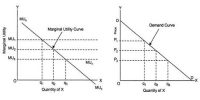Scarcity of resources is one of the more basic concepts of economics. Scarcity necessitates trade-offs, and trade-offs result in an opportunity cost. While the cost of a good or service often is thought of in monetary terms, the opportunity cost of a decision is based on what must be given up (the next best alternative) as a result of the decision. Any decision that involves a choice between two or more options has an opportunity cost.
Opportunity cost contrasts to accounting cost in that accounting costs do not consider forgone opportunities. Consider the case of an MBA student who pays $30,000 per year in and fees at a private university. For a two-year MBA program, the cost of tuition and fees-would be $60,000. This is the monetary cost of the education. However, when making the decision to go back to school, one should consider the opportunity cost, which includes the income that the student would have earned if the alternative decision of remaining in his or her job had been made. If the student had been earning 150,000 per year and was expecting a 10% salary, increase in one year, $105,000 in salary would be foregone as a result of the decision to return to school. Adding this amount to the educational expenses results in a cost of $165,000 for the degree.
Opportunity cost is useful when evaluating the cost and benefit of choices. It often is expressed in non-monetary terms. For example, if one has time for only one elective course, taking a course in microeconomics might have the opportunity cost of a course in management. By expressing the cost of one option in terms of the foregone benefits of another, the marginal costs and marginal benefits of the options can be compared.











